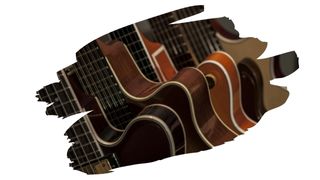Using Pine wood to build your guitar is a simple way to save money on timber — allowing you to skip over pricier lumbers, such as Mahogany.
What’s more, Pine is an affordable lightweight softwood that’s easy to cut and machine.
However, it’s low density means it can be fairly tricky to work with — especially when it can dent all too easily.
Nonetheless, what type of instrument can you expect to get from Pine wood? And does this soft timber have enough sustain to make for a great sounding acoustic guitar?
Well, in this post, you will learn what type of sound Pine wood produces. You will also find out why Pine wood is great for making guitar bodies — but not the neck or fretboard.
And keep reading to discover the difference between Roasted Pine and Pine wood — and what it means for the longevity of your guitar.

This post may contain affiliate links to products that we receive a commission for (at no additional cost to you). Learn more here.
What Is The Best Type Of Tonewood You Can Use For Making A Guitar?
The best type of wood depends on the type of guitar you’re making — and which section of the guitar you’re building.
You see, when it comes to tone wood, Mahogany is ideal for making midrange acoustic guitars. However, you shouldn’t use it for making the fretboard of your instrument.
But, while Mahogany is a great choice for making the guitar body, it is also very costly. So, if you want a more affordable wood, you can opt for Poplar wood instead.
Poplar is a lightweight timber with fairly neutral frequencies as a tonewood. However, if you’re looking for a budget-saving electric guitar, Poplar is perfect.
Related Post: Deciding Between Poplar Vs Mahogany Wood For Your Guitar
What About Pine? Can You Use Roasted Pine For A Guitar Body?
Pine wood in general is a perfectly solid choice for building an electric guitar. And, Roasted Pine wood is simply regular Pine wood thats been put through a high-heat treatment.
This heat treatment helps to make this wood more stable — and less likely to crack and splinter due to humidity. All of which make Roasted Pine a more durable version of Pine wood.
But, more importantly, as a tonewood, Pine has surprisingly warm mid-tones to it. So you can use Pine to make acoustic guitars, without having to sacrifice sound quality.
And Can You Use Pine To Make A Guitar Neck Too?
Pine is typically used for making guitar bodies. However, it’s not a very dense lumber — so it can feel fragile when you put compressional stress on it as you play.
Basically, if you were to press down hard on a Pine guitar neck, it is liable to snap. This is why Pine isn’t suitable for the guitar neck — and it certainly isn’t a good choice for making the fretboard.
Related Post: What Can You Use As A Rosewood Fretboard Finish? (Revealed!)
Wait A Second…Why Wouldn’t You Use Pine Wood For A Fretboard?
Well, fretboards are very thinly cut. So the wood you use to make them needs to be very hard and dense.
And the big problem with using Pine for fretboards, is the fact that Pine is already a pretty soft timber. So, if you were to use Pine to make the fretboard, it will crack under the pressure of your fingers.
OK. But Is Pine Really That Good For An Electric Guitar Body?
Sure, it is. In fact, there’s nothing stopping you from using this softwood for either acoustic or electric guitars.
At the end of the day, the guitar body (not the fretboard or neck) has the greatest impact on the quality of sound. And this is why your selection of tonewood matters a lot when it comes to your acoustic instrument.
But, tonewood doesn’t matter as much when it comes to electric guitars. So, Pine wood works well as a wood option for electric guitars.
To Wrap Up, Here Are The 3 Key Takeaways From This Post…
- 1). Pine wood is an affordable wood choice for electric guitar builds.
- 2). Pine will work fine for the body of the guitar. However, it is not hard enough for the fretboards or necks.
- 3). As a tonewood for acoustic guitars, you can expect Pine wood to produce warm mid range tones.



